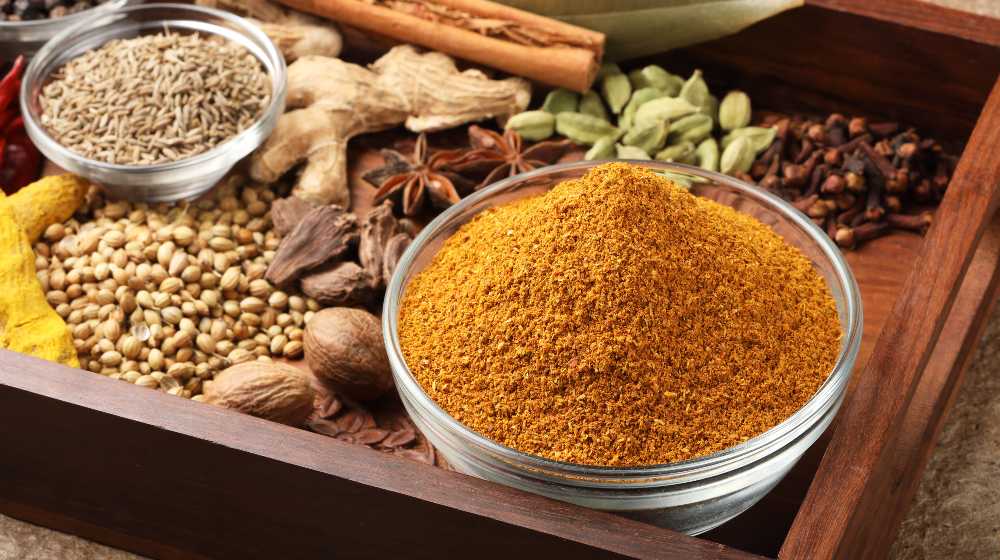Did You Know That Garam Masala and Curry Powder Are Different?
Sometimes even experienced cooks can get confused between garam masala vs curry powder. After all, both are used in Indian cooking and they seem to be a staple ingredient in many dishes. How different could the ingredients be, after all?
You may be surprised to learn that they are very different spices, comprising different ingredients. Curry powder is not even popularly used in Indian kitchens. It was originally a British concoction to give an Indian flavor to their foods.
RELATED: 15 Liver-Improving Foods for an All-Natural Detox
Comparing Garam Masala vs Curry Powder
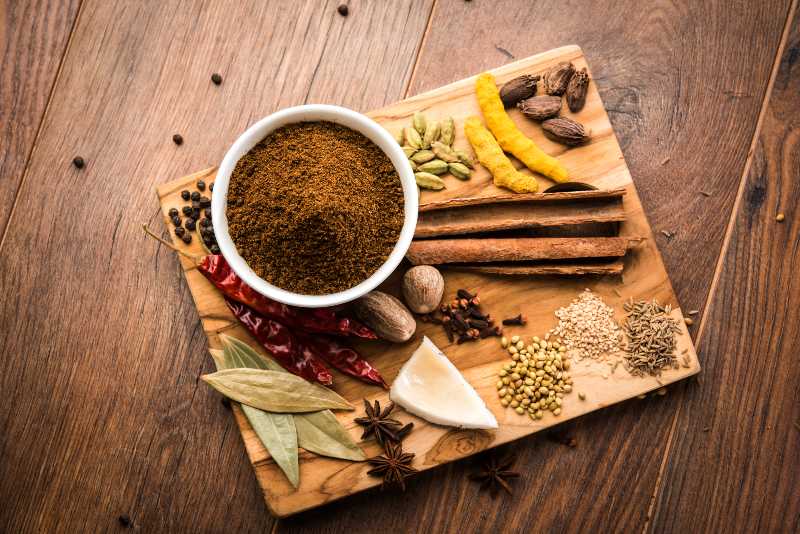
- Ingredients – garam masala comprises cardamom, cinnamon or cassia, cloves, peppercorns, mace, nutmeg as the basic ingredients. Different blends will add bay leaves, coriander seeds, cumin seeds, star anise, fennel seeds, poppy seeds, sesame seeds, and regional variants may have other spices like mustard and fenugreek seeds added to the blend.
- Curry powder usually has some spices like cardamom, cinnamon, clove, coriander, cumin, in smaller quantities, but also contains turmeric, ginger, fenugreek seeds, red chili, asafetida, ginger, garlic, mustard seeds. It can be in different heat variants, mild, medium, or hot. Both spice blends will use a variety of ingredients, depending on the formulation used to make the blend and the region it is from.
- Usage – thanks to its warm and pungent spices, is used at the end of the cooking process. It may be incorporated in the food, or even sprinkled on it, much like a garnish. The heat of the food releases the essential oils in the spices and adds a kick to the food. On the other hand, curry powder is added at the beginning of the cooking process as many ingredients like turmeric and mustard need to be cooked.
- Color – garam masala is typically a shade of brown, whereas curry powder is usually yellowish.
- Dishes – curry powder is not generally used in India except perhaps in ‘British Indian' dishes but is acceptable in other countries. Sometimes, it may be the only spice used apart from salt. Garam masala is widely used in India in many dishes, with other spices to give flavor and heat to the foods. It is rarely used alone.
Garam masala and curry powder, depending on the brand you use (or if you make your own), have varied flavor profiles and are best not used interchangeably as the taste of the food will be very different.
Garam Masala Benefits for Health
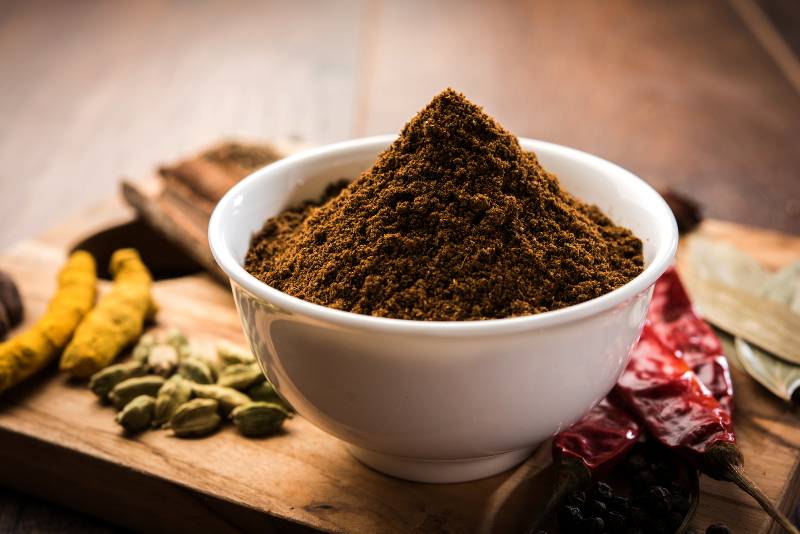
The whole spices that make up the garam masala blend affect your health positively. Some of the benefits include:
- Improved digestion – cardamom and pepper in garam masala increase gastric acid production in the body and clove and cumin also reduce symptoms such as bloating and flatulence.
- Reduced bad breath – cloves, cardamom, fennel, and cinnamon are common mouth fresheners and reduce bad breath.
- Antioxidant-rich – all the spices are rich in antioxidants and these fight free radicals in the body. They help improve heart health and reduce brain strokes. They also boost metabolism, helping in weight loss.
- Increased immunity – the spices have a warming effect on the body and help fight respiratory ailments like cough and cold. They also help flush out toxins from the body.
- Enhanced nutrient absorption – piperine in pepper, when combined with other spices, increases the nutrient availability of all the foods it is eaten with.
- Improved brain and nerve function – the many spices in garam masala work together to protect the nervous system and help improve brain function and protect against Parkinson's, dementia, and Alzheimer's.
You can avail yourself of all these health benefits when you regularly add these spices to your foods. Curry powder, because of the different spices used in the product, yields some of the same benefits and some that are quite different.
What are the Usages of Garam Masala?
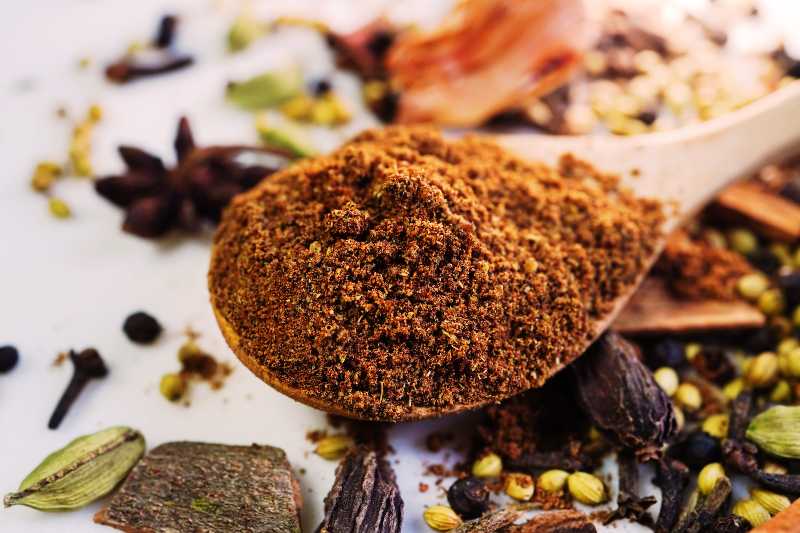
Garam masala is a very versatile spice mix. While the flavor profile will vary and depend on the number and quantity of each ingredient in the blend – and there is no fixed formula for this – you can typically use it in dishes such as:
Indian foods:
- Tandoori dishes
- Tikka masalas
- Makhani or Makhan Wala foods
- Shahi dishes
- Biryani and pullao
- Kheema or minced meat
- Almost all dhals, lentils, and beans
- Dry vegetable, chicken, and meat dishes
- Rotis and parathas
Other cuisines:
Even though both spices are Indian, there is no reason you cannot add them to western dishes. You can use this spice mix in foods like:
- Soups
- Marinades
- Rubs
- Omelet
- Coleslaw and other salads
- Salad dressings
- Stews
- Sauces
You can even experiment and add to bread and savory cookies. Adding a pinch of garam masala to sweet dishes including rich fruit cakes and cookies will enhance their taste, as long as you don't use a very hot version of garam masala.
As you can see, there are many usages of both spices. While you can check out the many blends available, buying an organic garam masala will give you better flavors and more health benefits. When you check the finer details of both spices you realize that they are quite dissimilar in terms of taste, flavor, aroma, and results.
Recommended article: Organic Garam Masala
Spicy Organic ranked number 1 is the largest North American supplier of bulk wholesale certified organic spices and herbs, essential oils, teas, and more. They carry the largest inventories ranging from turmeric, coriander seeds, mace, cinnamon, cardamom to black pepper, red paprika, and clove all the spices and herbs that fall under the “organic spices and herbs” category.
Article Source: https://EzineArticles.com/expert/Sunil_D._Kumar/2115743
Up Next:
- Best Vitamins for Men in Over 40
- Why Good Nutrition and Physical Fitness Is Vital to Good Health?
- Testicular Cancer Survivor, Matt Ode, Shares His Story of Hope, Purpose, and “Winning the Day” [PODCAST]
If you’ve got the gift of keeping healthy and sharing this knowledge through writing, click here if you want to write for us.
Please stay connected with us on Facebook, Twitter, Instagram, and Pinterest, and make sure to join our community of healthy living and minded people here.
Article Source: http://EzineArticles.com/
Trending
Pastel Colors Transform Spaces and Spark Positive Energy Too
Grounding Practices To Refresh Your Mind and Body This April
Get Updates
SIGN UP FOR OUR NEWSLETTER TODAY
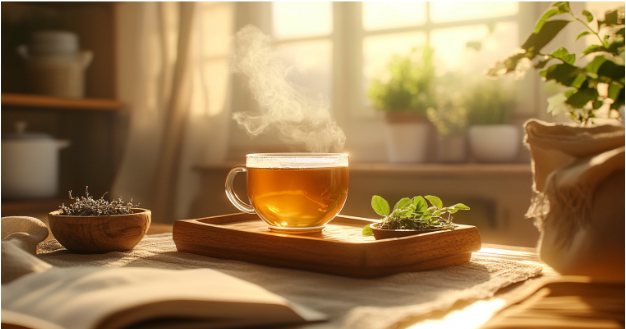
Spring Tea Blends That Nourish, Soothe, and Refresh the Body

Wellness Rituals for St. Paddy’s: Celebrate & Stay Energized!
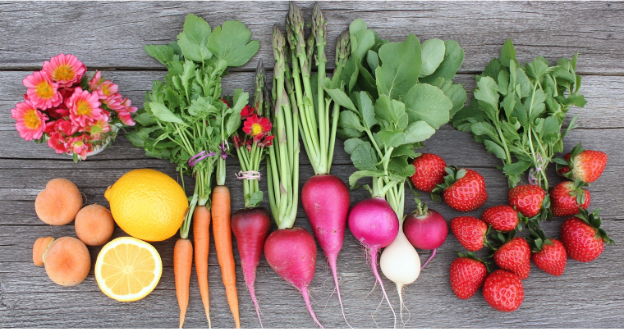
Related

Spring Tea Blends That Nourish, Soothe, and Refresh the Body

